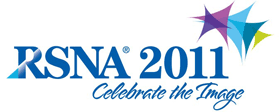
Abstract Archives of the RSNA, 2011
LL-ROS-MO2A
DCE-MR in the Assessment of Tumor Response in Metastatic Renal Cell Carcinoma Patients Submitted to Antiangiogenic Therapy
Scientific Informal (Poster) Presentations
Presented on November 28, 2011
Presented as part of LL-ROS-MO: Radiation Oncology/Radiobiology
Valeria Panebianco MD, Presenter: Nothing to Disclose
Roberto Iacovelli, Abstract Co-Author: Nothing to Disclose
Andrea Marcantonio, Abstract Co-Author: Nothing to Disclose
Daniela Curzio, Abstract Co-Author: Nothing to Disclose
Enrico Cortesi, Abstract Co-Author: Nothing to Disclose
Roberto Passariello, Abstract Co-Author: Nothing to Disclose
Tumor vascularity is a potential predictor of treatment outcomes in metastatic renal cell carcinoma (mRCC), and contrast enhancement of tumors in MR is correlated significantly with microvessel density. In this study, we investigated if tumor enhancement in MRP is useful for predicting outcomes in patients with mRCC who are receiving antiangiogenic therapy.
Thirty-one consecutive patients, twenty eight males and three females, with a mean age of 63 years (49-72 years), with mRCC were enrolled. A total of 108 lesions were evaluated but we considered 31 lesions as target lesion (one for each patient). All patients underwent MR examination on 1,5 T scanner (Magnetom Avanto, Siemens, Germany) equipped with double surface phased array (abdomen and pelvis); sequences were acquired before and after i.v. contrast agent administration (10 mL of Gadobutrol, 1M). MR examination was performed before treatment and 4 weeks, 8 weeks and 12 weeks after treatment. Scan protocol included morphologic imaging with TSE T2-weighted sequences on the axial, sagittal and coronal planes dynamic contrast enhanced imaging using 3D FLASH T1-weigthed sequence.
Tumor size was reduced in 23/31 lesions ( 74 %), was increased in 6/31 lesions ( 19 %) and was stable in 2/31 lesions (6%).Tumor vascularization was reduced in 25/31 lesions (80%) and other 8 lesions showed marked disease progression
Our data indicate that MR imaging provides a tool for early monitoring of antiangiogenic treatment and can identify lesion reduction in terms of volume and vascularization. MR is a radiation free modality useful in the evaluation of antiangiogenic treatment response in patients with mRCC and influences clinical decision for oncologic patients’ management.
monitoring of antiangiogenic treatment and can identify lesion reduction in terms of volume and vascularization
Panebianco, V,
Iacovelli, R,
Marcantonio, A,
Curzio, D,
Cortesi, E,
Passariello, R,
DCE-MR in the Assessment of Tumor Response in Metastatic Renal Cell Carcinoma Patients Submitted to Antiangiogenic Therapy . Radiological Society of North America 2011 Scientific Assembly and Annual Meeting, November 26 - December 2, 2011 ,Chicago IL.
http://archive.rsna.org/2011/11034642.html

